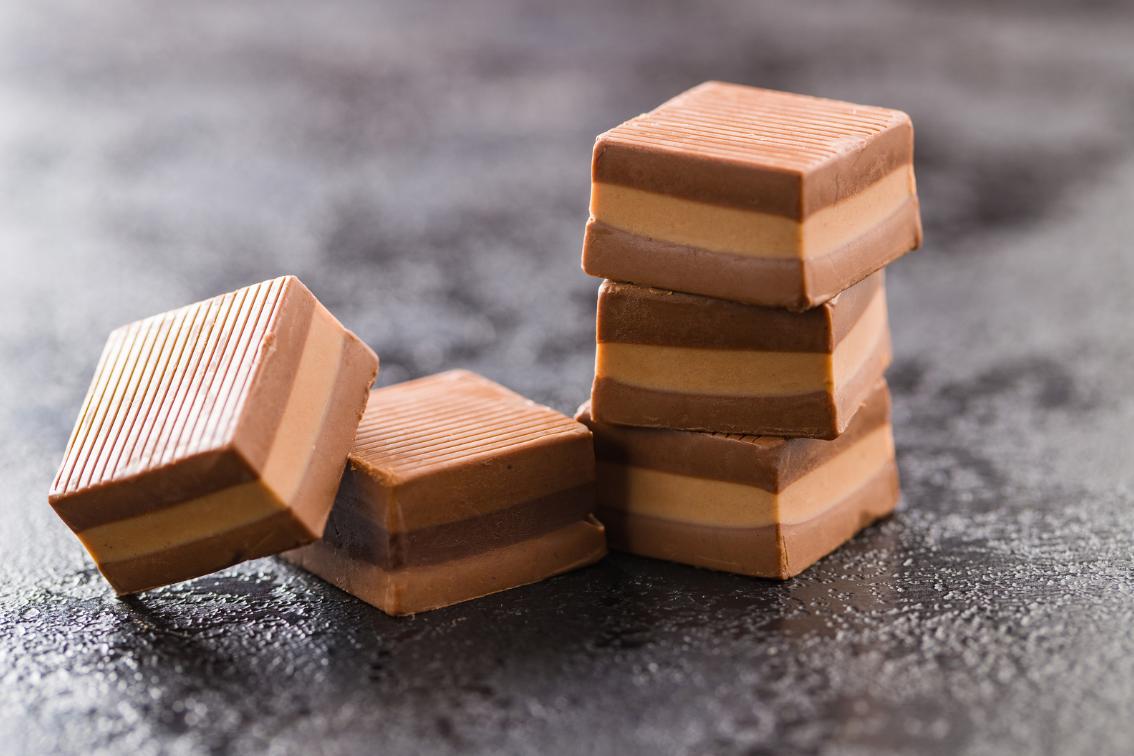Table of Contents
เจลาตินที่กินได้คือไฮโดรไลเสตของคอลลาเจน ซึ่งเป็นโปรตีนสูงที่ไม่มีไขมันหรือคอเลสเตอรอล และเป็นสารเพิ่มความข้นของอาหารทางโภชนาการตามธรรมชาติ
เจลาตินมีความสามารถพิเศษในการเป็นเจลแบบพลิกกลับได้ในกระติกน้ำร้อน ซึ่งสามารถละลายในน้ำอุ่นและกลายเป็นเจลได้หลังจากเย็นลง

มีการใช้กันอย่างแพร่หลายในการผลิตขนมหวาน ผลิตภัณฑ์นม เครื่องดื่ม เนื้อสัตว์ ขนมอบ ขนมหวาน และอาหารปรุงสุก
| เจลาตินประกอบด้วยกรดอะมิโน 18 ชนิด และคอลลาเจน 90 เปอร์เซ็นต์ |
| สามารถใช้เป็นสารก่อเจลในอาหาร สารเพิ่มความคงตัว สารเพิ่มความข้น สารทำให้เกิดฟอง อิมัลซิไฟเออร์ สารช่วยกระจายตัว สารให้ความกระจ่าง ฯลฯ |
| เป็นวัตถุเจือปนอาหารผลิตภัณฑ์โปรตีนธรรมชาติบริสุทธิ์ที่ใช้กันอย่างแพร่หลายในอุตสาหกรรมอาหาร |
| เป็นสิ่งสำคัญสำหรับผู้บริโภคที่จะต้องตระหนักถึงความเสี่ยงต่อสุขภาพที่อาจเกิดขึ้นซึ่งเกี่ยวข้องกับพลาสติไซเซอร์ในแคปซูลเจลาตินชนิดแข็ง แม้ว่าระดับของสารเคมีเหล่านี้ในแคปซูลจะถูกควบคุมโดยหน่วยงานด้านสุขภาพ แต่ก็ยังมีความเป็นไปได้ที่จะได้รับสารผ่านการใช้ยาหรืออาหารเสริมทุกวัน เพื่อลดความเสี่ยงในการสัมผัสกับพลาสติไซเซอร์ ผู้บริโภคสามารถใช้ความระมัดระวังบางประการเมื่อเลือกและใช้แคปซูลเจลาตินชนิดแข็ง |
| วิธีหนึ่งในการลดการสัมผัสกับพลาสติไซเซอร์คือการเลือกใช้แคปซูลที่ทำจากวัสดุทางเลือก เช่น แคปซูลมังสวิรัติหรือแคปซูลเคลือบลำไส้ แคปซูลประเภทนี้ไม่มีพลาสติไซเซอร์และถือว่าปลอดภัยกว่าสำหรับการบริโภค ผู้บริโภคยังสามารถมองหาผลิตภัณฑ์ที่มีป้ายกำกับว่า “ปลอดสารพาทาเลท” หรือ “ปลอดสาร BPA” เพื่อให้แน่ใจว่าผลิตภัณฑ์เหล่านั้นจะไม่สัมผัสกับสารเคมีที่เป็นอันตราย โดยสรุป พลาสติไซเซอร์ในแคปซูลเจลาตินชนิดแข็งก่อให้เกิดความเสี่ยงต่อสุขภาพที่อาจเกิดขึ้นซึ่งผู้บริโภคควรระวัง ตระหนักถึง. แม้ว่าสารเคมีเหล่านี้จะมีจุดประสงค์ในทางปฏิบัติในการผลิตแคปซูล แต่ก็อาจส่งผลเสียต่อสุขภาพของมนุษย์ได้เมื่อรับประทานเข้าไป ด้วยการเลือกใช้วัสดุแคปซูลทางเลือกและการคำนึงถึงฉลากผลิตภัณฑ์ ผู้บริโภคสามารถลดการสัมผัสกับพลาสติไซเซอร์และปกป้องสุขภาพของตนเองได้ เป็นสิ่งสำคัญสำหรับผู้ผลิตและหน่วยงานด้านสุขภาพที่จะต้องติดตามการใช้พลาสติไซเซอร์ในแคปซูลต่อไป และดำเนินการเพื่อความปลอดภัยของผู้บริโภค |
| ทางเลือกที่ยั่งยืนสำหรับพลาสติไซเซอร์ในแคปซูลเจลาตินแข็ง |
พลาสติไซเซอร์มักใช้ในการผลิตแคปซูลเจลาตินแข็งเพื่อปรับปรุงความยืดหยุ่นและความทนทาน อย่างไรก็ตาม การใช้พลาสติไซเซอร์แบบดั้งเดิม เช่น พทาเลท ทำให้เกิดความกังวลเนื่องจากอาจมีความเสี่ยงด้านสุขภาพและสิ่งแวดล้อม ด้วยเหตุนี้ จึงมีความต้องการทางเลือกที่ยั่งยืนแทนการใช้พลาสติไซเซอร์ในแคปซูลเจลาตินแข็ง
ทางเลือกหนึ่งที่ยั่งยืนแทนพลาสติไซเซอร์แบบดั้งเดิมคือการใช้พลาสติไซเซอร์ธรรมชาติที่ได้มาจากแหล่งหมุนเวียน พลาสติไซเซอร์ธรรมชาติเหล่านี้สามารถย่อยสลายได้ทางชีวภาพและไม่เป็นพิษ ทำให้เป็นตัวเลือกที่เป็นมิตรต่อสิ่งแวดล้อมมากกว่าเมื่อเปรียบเทียบกับสารสังเคราะห์ ตัวอย่างของพลาสติไซเซอร์ธรรมชาติ ได้แก่ ซิเตรต กลีเซอรอล และซอร์บิทอล ซึ่งแสดงให้เห็นว่ามีประสิทธิภาพในการปรับปรุงความยืดหยุ่นของแคปซูลเจลาตินแข็ง
นอกเหนือจากพลาสติไซเซอร์ตามธรรมชาติแล้ว ยังมีพลาสติไซเซอร์ชีวภาพที่ได้มาจากแหล่งชีวมวล เช่น เป็นน้ำมันพืช พลาสติไซเซอร์ชีวภาพเหล่านี้ให้ประโยชน์ด้านประสิทธิภาพที่คล้ายคลึงกันกับพลาสติไซเซอร์แบบดั้งเดิม แต่มีข้อได้เปรียบเพิ่มเติมคือมีความยั่งยืนและเป็นมิตรต่อสิ่งแวดล้อม ตัวอย่างของพลาสติไซเซอร์ชีวภาพ ได้แก่ น้ำมันถั่วเหลืองอิพอกซิไดซ์และอะซีทิล ไตรบิวทิล ซิเตรต ซึ่งประสบความสำเร็จในการใช้ในการผลิตแคปซูลเจลาตินแข็ง
ทางเลือกที่ยั่งยืนอีกทางหนึ่งนอกเหนือจากพลาสติไซเซอร์แบบดั้งเดิมคือการใช้พลาสติไซเซอร์ที่ใช้โพลีเมอร์ พลาสติไซเซอร์ที่ทำจากโพลีเมอร์เหล่านี้มักทำจากโพลีเมอร์หมุนเวียน เช่น อนุพันธ์เซลลูโลสหรือแป้ง ซึ่งสามารถย่อยสลายได้ทางชีวภาพและไม่เป็นพิษ พลาสติไซเซอร์ที่ใช้โพลีเมอร์แสดงให้เห็นว่ามีประสิทธิภาพในการปรับปรุงความยืดหยุ่นของแคปซูลเจลาตินแข็ง ในขณะเดียวกันก็ลดผลกระทบต่อสิ่งแวดล้อมจากการผลิตด้วย
นอกจากนี้ ความก้าวหน้าทางเทคโนโลยีได้นำไปสู่การพัฒนาสูตรนวัตกรรมที่ปราศจากพลาสติไซเซอร์สำหรับแคปซูลเจลาตินแข็งที่เป็นนวัตกรรม . สูตรเหล่านี้ใช้เทคนิคใหม่ๆ เช่น การอัดขึ้นรูปด้วยความร้อนหรือการอบแห้งแบบพ่นฝอย เพื่อให้ได้ความยืดหยุ่นและความทนทานตามที่ต้องการของแคปซูลโดยไม่ต้องใช้พลาสติไซเซอร์แบบดั้งเดิม ด้วยการเลิกใช้พลาสติไซเซอร์โดยสิ้นเชิง สูตรเหล่านี้เสนอทางเลือกที่ยั่งยืนและเป็นมิตรต่อสิ่งแวดล้อมมากขึ้นสำหรับการผลิตแคปซูลเจลาตินชนิดแข็ง
โดยรวมแล้ว ความต้องการทางเลือกที่ยั่งยืนแทนพลาสติไซเซอร์ในแคปซูลเจลาตินชนิดแข็งกำลังขับเคลื่อนนวัตกรรมในอุตสาหกรรมยา พลาสติไซเซอร์ธรรมชาติ พลาสติไซเซอร์ชีวภาพ พลาสติไซเซอร์ที่ใช้โพลีเมอร์ และสูตรปลอดพลาสติไซเซอร์ ล้วนเป็นทางเลือกที่เป็นไปได้ในการปรับปรุงความยืดหยุ่นและความทนทานของแคปซูลในขณะที่ลดผลกระทบต่อสิ่งแวดล้อม ด้วยการเลือกทางเลือกที่ยั่งยืนแทนพลาสติไซเซอร์แบบดั้งเดิม บริษัทยาสามารถมีส่วนร่วมในอนาคตที่ยั่งยืนและเป็นมิตรกับสิ่งแวดล้อมมากขึ้นสำหรับการผลิตแคปซูลเจลาตินชนิดแข็ง
In conclusion, plasticizers in hard gelatin capsules pose potential health risks that consumers should be aware of. While these chemicals serve a practical purpose in the production of capsules, they can have harmful effects on human health when ingested. By choosing alternative capsule materials and being mindful of product labels, consumers can reduce their exposure to plasticizers and protect their health. It is important for manufacturers and health authorities to continue monitoring the use of plasticizers in capsules and take steps to ensure the Safety of consumers.
Sustainable Alternatives to Plasticizers in Hard Gelatin Capsules
Plasticizers are commonly used in the production of hard gelatin capsules to improve their flexibility and durability. However, the use of traditional plasticizers such as phthalates has raised concerns due to their potential health and environmental risks. As a result, there is a growing demand for sustainable alternatives to plasticizers in hard gelatin capsules.
One sustainable alternative to traditional plasticizers is the use of natural plasticizers derived from renewable sources. These natural plasticizers are biodegradable and non-toxic, making them a more environmentally friendly option compared to their synthetic counterparts. Examples of natural plasticizers include citrates, glycerol, and sorbitol, which have been shown to be effective in improving the flexibility of hard gelatin capsules.
In addition to natural plasticizers, there are also bio-based plasticizers that are derived from biomass sources such as vegetable oils. These bio-based plasticizers offer similar performance benefits as traditional plasticizers but with the added advantage of being more sustainable and environmentally friendly. Examples of bio-based plasticizers include epoxidized soybean oil and acetyl tributyl citrate, which have been successfully used in the production of hard gelatin capsules.
Another sustainable alternative to traditional plasticizers is the use of Polymer-based plasticizers. These polymer-based plasticizers are typically made from renewable polymers such as cellulose derivatives or Starch, which are biodegradable and non-toxic. Polymer-based plasticizers have been shown to be effective in improving the flexibility of hard gelatin capsules while also reducing the environmental impact of their production.
Furthermore, advances in technology have led to the development of innovative plasticizer-free formulations for hard gelatin capsules. These formulations utilize novel techniques such as hot melt extrusion or spray drying to achieve the desired flexibility and durability of capsules without the need for traditional plasticizers. By eliminating the use of plasticizers altogether, these formulations offer a more sustainable and environmentally friendly option for the production of hard gelatin capsules.
Overall, the demand for sustainable alternatives to plasticizers in hard gelatin capsules is driving innovation in the pharmaceutical industry. Natural plasticizers, bio-based plasticizers, polymer-based plasticizers, and plasticizer-free formulations are all viable options for improving the flexibility and durability of capsules while reducing their environmental impact. By choosing sustainable alternatives to traditional plasticizers, pharmaceutical companies can contribute to a more sustainable and eco-friendly future for the production of hard gelatin capsules.

